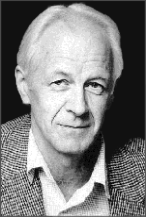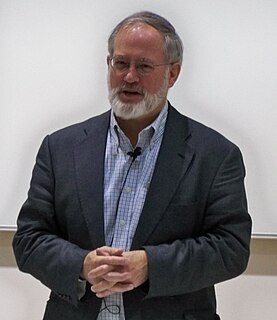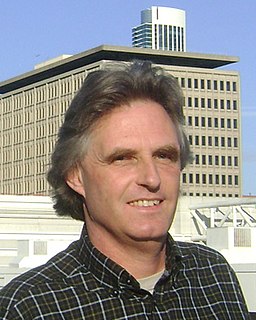
John Maynard Smith was a British theoretical and mathematical evolutionary biologist and geneticist. Originally an aeronautical engineer during the Second World War, he took a second degree in genetics under the well-known biologist J. B. S. Haldane. Maynard Smith was instrumental in the application of game theory to evolution with George R. Price, and theorised on other problems such as the evolution of sex and signalling theory.
John Philippe Rushton was a Canadian psychologist and author. He taught at the University of Western Ontario until the early 1990s, and became known to the general public during the 1980s and 1990s for research on race and intelligence, race and crime, and other purported racial correlations.

Lynn Margulis was an American evolutionary biologist, and was the primary modern proponent for the significance of symbiosis in evolution. Historian Jan Sapp has said that "Lynn Margulis's name is as synonymous with symbiosis as Charles Darwin's is with evolution." In particular, Margulis transformed and fundamentally framed current understanding of the evolution of cells with nuclei – an event Ernst Mayr called "perhaps the most important and dramatic event in the history of life" – by proposing it to have been the result of symbiotic mergers of bacteria. Margulis was also the co-developer of the Gaia hypothesis with the British chemist James Lovelock, proposing that the Earth functions as a single self-regulating system, and was the principal defender and promulgator of the five kingdom classification of Robert Whittaker.

Evolutionary biology is the subfield of biology that studies the evolutionary processes that produced the diversity of life on Earth. Simply, it is also defined as the study of the history of life forms on Earth. Evolution is based on the theory that all species are related and they gradually change over time. In a population, the genetic variations affect the physical characteristics i.e. phenotypes of an organism. These changes in the phenotypes will be an advantage to some organisms, which will then be passed onto their offspring. Some examples of evolution in species over many generations are the Peppered Moth and Flightless birds. In the 1930s, the discipline of evolutionary biology emerged through what Julian Huxley called the modern synthesis of understanding, from previously unrelated fields of biological research, such as genetics and ecology, systematics, and paleontology. A person who studies Evolutionary biology is called an Evolutionary biologist. The importance of studying Evolutionary biology is mainly to understand the principles behind the origin and extinction of species.

Allan Charles Wilson FRS AAA&S was a Professor of Biochemistry at the University of California, Berkeley, a pioneer in the use of molecular approaches to understand evolutionary change and reconstruct phylogenies, and a revolutionary contributor to the study of human evolution. He was one of the most controversial figures in post-war biology; his work attracted a great deal of attention both from within and outside the academic world. He is the only New Zealander to have won the MacArthur Fellowship.
Brian Charlesworth is a British evolutionary biologist at the University of Edinburgh, and editor of Biology Letters. Since 1997, he has been Royal Society Research Professor at the Institute of Evolutionary Biology (IEB) in Edinburgh. He has been married since 1967 to the British evolutionary biologist Deborah Charlesworth.
Deborah Charlesworth is a population geneticist from the UK, notable for her important discoveries in population genetics and evolutionary biology. Her most notable research is in understanding the evolution of recombination, sex chromosomes and mating system for plants.

Randolph M. Nesse is an American physician, scientist and author who is notable for his role as a founder of the field of evolutionary medicine and evolutionary psychiatry. He is professor of life sciences and ASU Foundation Professor at Arizona State University, where he became the Founding Director of the Center for Evolution and Medicine in 2014. He was previously a professor of psychiatry, professor of psychology and research professor at the University of Michigan where he led the Evolution and Human Adaptation Program and helped to establish one of the world’s first anxiety disorders clinics and conducted research on neuroendocrine responses to fear.
Paul H. Harvey is a British evolutionary biologist. He is Professor of Zoology and was head of the zoology department at the University of Oxford from 1998 to 2011 and Secretary of the Zoological Society of London from 2000 to 2011, holding these posts in conjunction with a professorial fellowship at Jesus College, Oxford.

The Journal of Evolutionary Biology is a peer-reviewed scientific journal published monthly covering the field of evolutionary biology. It is owned by the European Society for Evolutionary Biology. The founding editor-in-chief was Stephen C. Stearns. He was succeeded by Pierre-Henri Gouyon (1992–1995), Rolf Hoekstra (1996–1999), Peter van Tienderen (2000–2003), Juha Merilä (2004–2007), Allen Moore (2007–2010), Michael G. Ritchie (2011-2017), and Wolf U. Blanckenhorn (2017-2021). The current editor is Max Reuter.
Laurent Keller is a Swiss evolutionary biologist, myrmecologist and author. Since 1996, he is professor at the University of Lausanne.

Denis Buican is a Romanian-French scientist, bilingual writer, biologist, philosopher and a historian of science. He has studied genetics.
The Bicentenary Medal is a scientific award given by the Linnean Society. It is awarded annually in recognition of work done by a biologist under the age of 40 years. The medal was first awarded in 1978 on the 200th anniversary of the death of Carl Linnaeus.
Axel Meyer is a German evolutionary biologist and a professor of zoology and evolutionary biology at the University of Konstanz, Germany.

Stephen C. Stearns is an American biologist, and the Edward P. Bass Professor of Ecology and Evolutionary Biology Emeritus at Yale University. He is known for his work in life history theory and evolutionary medicine.

Ulrich Kutschera is a former German professor of biology who works as an academic advisor at I-Cultiver, Inc. in San Francisco and as a visiting scientist in Stanford/Palo Alto, California, US. He is the founder and head of "AK Evolutionbiologie", an association of evolutionary biologists in Germany. Starting in the 2000s, Kutschera started engaging with the public, first as a critic of creationism and intelligent design. Since the mid-2010s, his public statements and popular books focused on climate skepticism and criticism of gender studies.
The Society for Molecular Biology and Evolution (SMBE) is a scientific and academic organization founded in 1982 to support academic research in the field of molecular evolution. The society hosts an annual meeting, typically in June or July. It also supports satellite meetings throughout the year. The Society's first president was evolutionary biologist Walter M. Fitch. The current President is James McInerney.
Rüdiger Bieler is a German-American biologist whose primary scientific field of study is malacology, the study of mollusks.
Jonathan B. Losos is an American evolutionary biologist and Herpetologist.
Roger Kenneth Butlin is a British evolutionary biologist and professor at the University of Sheffield. He is known for his work on speciation. He served as Editor of Heredity from 2009 to 2012, and President of the Society for the Study of Evolution from 2013 to 2015. In 2015 he received the Darwin Wallace Medal.








